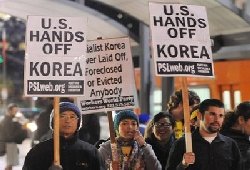North Korea has criticized major land and sea military exercises staged by the South, but stopped short of threatening a retaliatory strike as tension remained high on the divided peninsula.
In a show of military might, South Korea started a major land drill in the Pocheon region on Thursday (0500 GMT), between Seoul and the heavily armed demilitarized zone (DMZ) separating the two Koreas.
It also continues with naval live fire exercises 100km south of the maritime border with North Korea.
The drill, involving a larger scale of firepower and personnel than the usual exercise at the army training ground, is an indication that Lee Myung-bak, South Korea’s president, wants to underscore renewed determination to stand tough with the North.
Al Jazeera's Steve Chao, reporting from Seoul, says South Korea sees the drill as justified "as it is taking place on its sovereign territory".
"However, they have made it very clear that they are willing at this point to escalate tensions in favor of its hardline policy adopted since the North Korean attack in November. That is the mood of the government here and they seem very intend to move ahead with this."
Lee has replaced his top defense officials with more hawkish military men, a response to criticism of a perceived weak response to hostile acts from the North, including an alleged submarine attack in March and the shelling of an island last month.
"We're keeping up the alert," a defense ministry official said on the condition of anonymity.
'Provocative'
A large contingent of mechanized units operating tanks, three dozen self-propelled artillery, fighter jets and multiple rocket launchers, are taking part in the live fire drill just miles from the border with the North.
"(South Korea) is trying to hide the provocative nature toward the North of the war exercises," Pyongyang's official KCNA news agency said in a comment issued in the form of a news dispatch rather than in the name of any government organization.
The South Korean Army is making no secret that the drill is aimed at displaying its firepower to its neighbor.
"Yes, it will be a show of force against that," an army officer said on Wednesday, when asked if the shelling of South Korea's Yeonpyeong island last month was a factor, although he said similar drills had been staged before.
Seoul's financial markets were steady as investors kept a close eye on how North Korea will react to the drills, although the Pyongyang's threatening remarks had in the past failed to have a lasting effect.
In the run-up to the drill, the North's reaction was relatively calm in comparison with its threats of a retaliatory strike made as recently as last week, before Monday's live firing drill on Yeonpyeong, which lies in disputed waters off the west coast of the peninsula.
Its official Rodong Sinmun newspaper accused the US of conspiring with the South and Japan to bring war to the Korean peninsula.
"The Korean peninsula has turned sharply unstable on the brink of war due to scheming by the US to militarily stifle the North," the commentary said.
'Retaliatory strike unlikely'
Analysts say the North is unlikely, in the near-term at least, to launch a further attack against the South like last month's shelling of Yeonpyeong or the alleged sinking in March of the Cheonan warship.
The South accuses North Korea of sinking the vessel, though the North denies involvement.
For now, the North is likely to wait and see if its latest actions, including an offer to readmit international nuclear inspectors, yield results, such as a return to international talks on Pyongyang's nuclear program.
China, the impoverished North's only major ally, has urged dialogue to resolve the crisis and has been reluctant lay to blame, frustrating Washington and its allies which want Beijing to do more to rein in Pyongyang.
Barack Obama, the US president, is expected to press this point when Hu Jintao, the Chinese president, visits the US on January 19.
Despite the North's muted response this week, South Korea should not be complacent because Pyongyang will probably strike again when the conditions are right, Andrei Lankov at Kookmin University in Seoul said.
"The North Korean leaders did not duck the fight this time because they were afraid," he wrote in Financial Times earlier this week referring to the Monday's drills.
"Rather, they did what a cold-minded tactician should do: they avoided an engagement under unfavorable conditions chosen by the opponent, in order to strike the opponent at the time and place of their own choice, suddenly and forcefully."
PHOTO CAPTION
Anti-war demonstrators protest against US involvement and escalation of the military crisis between North Korea and South Korea, in Los Angeles on November 29, 2010.
Al-Jazeera


 Home
Home Discover Islam
Discover Islam Quran Recitations
Quran Recitations Lectures
Lectures
 Fatwa
Fatwa Articles
Articles Fiqh
Fiqh E-Books
E-Books Boys & Girls
Boys & Girls  Ramadan
Ramadan Fatwa Audios
Fatwa Audios Month of Mercy
Month of Mercy Women
Women Eed Al- Fitr
Eed Al- Fitr Food Recipes
Food Recipes Videos
Videos

 Prayer Times
Prayer Times












